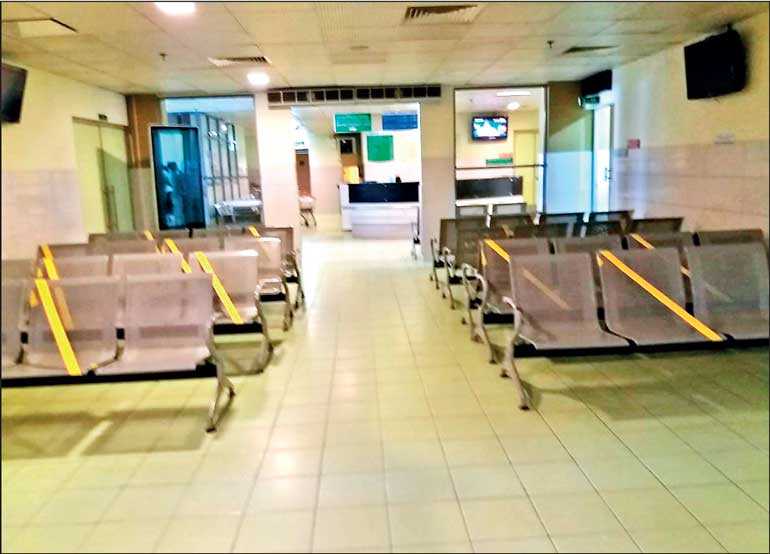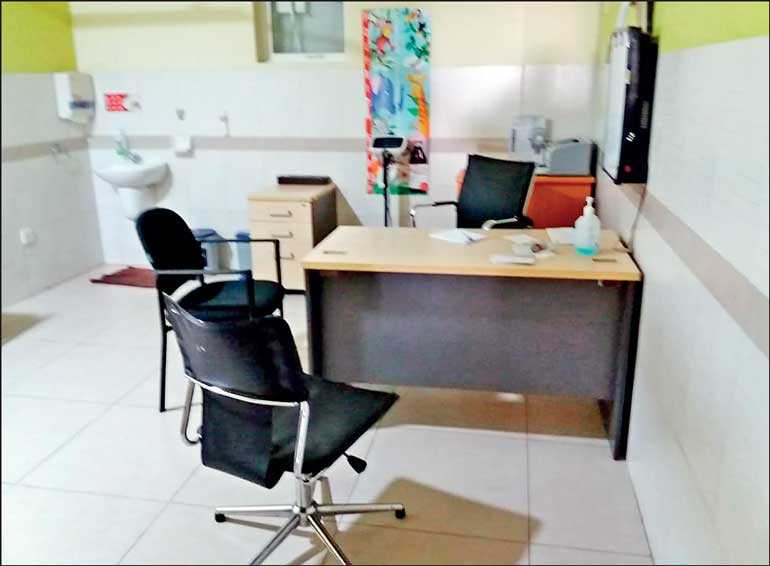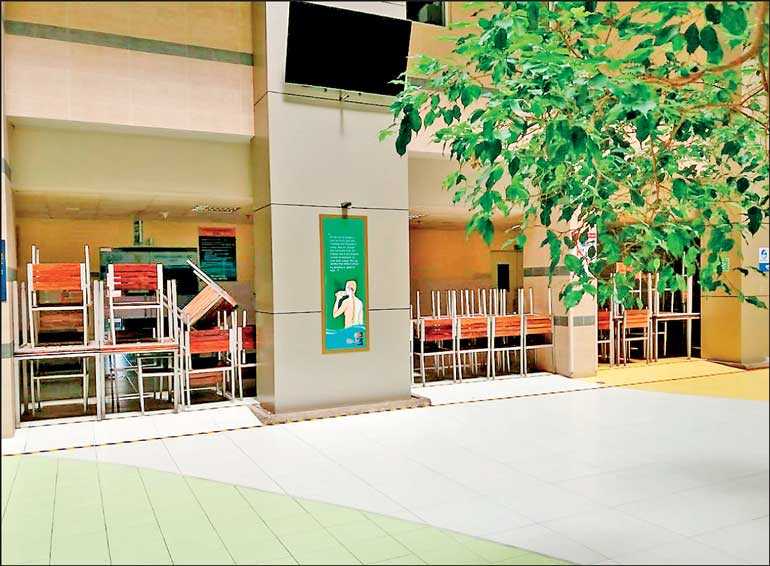Friday Feb 20, 2026
Friday Feb 20, 2026
Thursday, 30 April 2020 00:00 - - {{hitsCtrl.values.hits}}



By Morris Perera
Whatever happened to hundreds of people flocking to the leading private hospitals in Colombo and suburbs and major provincial cities? It was unbelievable and surprising to witness that most of the leading private hospitals and clinics in the city and suburbs, usually filled with thousands of people, looked deserted and devoid of their essential element, the sick patients during the last few days.
A cursory visit to a leading hospital on Saturday showed empty reception lobbies, unoccupied seats in waiting areas and consulting rooms without the consulting specialists. The institution appeared to be manned by a skeleton staff of nurses, medical orderlies and affiliated workers of related trades, themselves seemingly idle without their usual duties to perform. There were not many inpatients warded in the sprawling hospital complex either. Where have all those sick persons gone? Are they all driven away by the coronavirus?
In a given day under normal circumstances, thousands visit these private hospitals, as patients seeking OPD treatment or those who wish to consult specialist doctors or to obtain laboratory reports from blood, urine and stool tests and additionally, X-ray and radiology reports, MRI and US scans and latest investigative probes to help the experts to diagnose what is afflicting them and also immunisation for known communicable diseases. Most often, many patients are advised by the consulting doctors themselves to obtain these reports through medical tests carried out in the hospital itself before they decide what’s wrong with the patient.
All of these tests are very costly and the patients in their anxiety to seek treatment for curing the seeming illness, have to somehow find the money to undergo the prescribed tests. Added to the stream of patients, there are also those accompanying them to the clinics and friends and relations visiting the warded patients. With such huge crowds coming to private hospitals, it is a rigorous effort for one to get in to the designated lobbies or counters in the public areas of the hospital to obtain the required services for himself or herself.
The external environs of these hospitals are not to be outdone. There are streams of three-wheelers and cars bringing all these people into the hospital premises, congesting the access ways and clogging all the parking space, thereby helping the hospital to earn a lucrative income on the side, as parking fees.
This is also true of the Government hospitals, with the number of patients and accompanying kith and kin surpassing the numbers at private hospitals by big margins. However, the Government hospitals do not earn any income from the thousands of people seeking treatment.
With the advent of the corona pandemic, the usual run of the mill patient has apparently gone underground and they are not making their routine appearance at hospitals during this crucial period. A question arises whether they have been miraculously cured of their illness or are they coping with the aches and pains associated with their indisposition? Whatever the cause, majority of patients are not coming to the hospitals, state or private.
The number of patients seeking surgery for heart, liver or kidney ailments and cataract surgery are diminishing and as a result, the representatives of companies selling stents, artificial replacements, mechanical aids and artificial eye lenses for cataract surgery are anxiously waiting without fresh orders.
About four decades ago, when the demand for medical services started to rise, the Government hospitals were not geared and equipped to handle all the patients seeking treatment and the state, with so many welfare services and development projects on its hands with limited financial resources, was unable to expand the existing healthcare facilities as needed. The business community and some of the medical professionals who have made money through long years of service, identified the potential in Medicare services and started investing in private hospital projects that provided modern medical facilities with latest equipment.
The public found these up-to-date and efficient medical services provided by the private sector very attractive and convenient. They flocked in their numbers to these institutions for all types of medical services and the burden on the state health services sector was eased to some extent. However, with developments taking place in the state medical institutions as well, the influx of patients never abated. The privately-owned medical institutions thrived in this new environment and expanded their coverage in leaps and bounds.
Nevertheless, the demand for medical care offered by these private hospitals or the state sector never diminished and the private medical services expansion saw some state-of-the-art hospitals coming up with several medium and small scale hospitals in the suburbs and provincial cities.
Lucrative venture
The entrepreneurs and a few medical professionals engaged in this sector further invested billions in the ventures that provided healthcare services as it was very lucrative and as in any field of business activity, profit was one of the main motivational factors that drove this sector to expand and of course provide quality services. The customer, in this case, the patient is lured to come back for treatment for any medical condition that sometimes did not even warrant such high profile attention.
The business ventures, in this case, the private hospitals earned a huge income by providing ancillary services such as laboratory tests, specialised diagnostic tests and other services like physiotherapy. The surgical operations or dialysis recommended by consultants for many patients with incommunicable diseases such as heart conditions and kidney malfunction most often cost a fortune. Some patients have to sell their assets or borrow heavily to meet their medical expenses.
The private hospitals enlisted the services of specialist consultants in the state health services after private practice was permitted and also doctors who have completed mandatory service in the state sector or those qualified abroad. They also enlisted the services of competent and senior nursing staff with experience, supplemented by hundreds of young trainees in nursing. When one visits a private hospital, he or she is amazed by the sight of swarms of these trainee nurses. The trainees are paid a wage on daily or weekly basis and they are not on permanent cadre. This helps the hospital owners to maintain the salary bill within manageable levels. They also outsource janitorial and cleaning services.
The income of the private hospitals is derived from the usual clinical services and nursing care for warded patients and the costly charges levied for diagnostic lab tests and other tests carried out through radiology and scanning, done with expensive equipment and of course high cost surgery. The lucrative income from all these services helps the private hospitals to sustain the huge revenue levels and assured by the ever increasing stream of patients. To maintain a steady influx of patients, the hospitals provide a fairly high standard service and care.
With the dwindling numbers of patients at this juncture due to the corona pandemic, many private hospitals find it hard to maintain and run the services as done before and thereby lose income. As it is evident during the last three weeks, many patients have learnt to cope with their illness and forego costly medical treatment at high street private hospitals. There will be a time, when the income source of the private hospitals will diminish with reduced numbers of patients.
The private hospitals are facing financial strains and uncertainty that cannot be overcome soon. Their business outlook appears bleak at this moment of time and whether the situation will ease in the near future is unpredictable. They find themselves in a situation where it is difficult to make ends meet like the patients seeking treatment from the private hospitals, themselves.
According to an eminent medical specialist who shuns private practice unless he has to engage in that service due to essential or unavoidable circumstances, many a consultant and doctors prescribe expensive lab tests and diagnostic examinations as a matter of routine and at times, they may appear to be non-essential. This adds to the private hospital’s revenue and the private practitioner’s fee as well.
According to him, real life emergencies like domestic accidents too have fallen due to the lockdown situation and therefore it has reduced hospital admissions to that extent. The doctor says, surprisingly the infant and adult mortality has also reduced noticeably. He says that doctors who conform to ethical practices are in a way happy and want the authorities to bring in some regulatory measures as necessitated by the current situation because, when the lock down is lifted, the private hospitals and a few of the doctors engaging in unscrupulous practices will try to make good what they lost during the lockdown.
This eminent doctor wished to give some timely advice: “When the lockdown is lifted, stay away from unnecessary activities and never rush for medical advice unless it is a must. The current epidemic has signalled that you must take care of your health to survive. All other options have closed. If you stay healthy you survive. Learn more about your body, be vegetarian, and avoid junk food. The morning walk, yoga, meditation and mild exercising shall be your everyday routine. Give up addictions. Give up health-destroying habits. Make your body lean and detoxify regularly. Please avoid visits to doctors, specialists or clinics for small health issues. Improve your own immune system. You survive for your family and thereby help the country ultimately.”